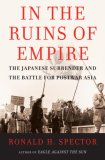
The Japanese Surrender and the Battle for Postwar Asia
by Ronald Spector
With access to recently available firsthand accounts by Chinese, Japanese, British, and American witnesses and previously top secret U.S. intelligence records, Spector tells for the first time the fascinating story of the deadly confrontations that broke out – or merely continued – in Asia after peace was proclaimed at the end of World War II. Under occupation by the victorious Allies, this part of the world was plunged into new power struggles or back into old feuds that in some ways were worse than the war itself. In the Ruins of Empire also shows how the U.S. and Soviet governments, as they secretly vied for influence in liberated lands, were soon at odds.
At the time of the peace declaration, international suspicions were still strong. Joseph Stalin warned that "crazy cutthroats" might disrupt the surrender ceremony in Tokyo Bay. Die-hard Japanese officers plotted to seize the emperor’s palace to prevent an announcement of surrender, and clandestine relief forces were sent to rescue thousands of Allied POWs to prevent their being massacred.
In the Ruins of Empire paints a vivid picture of the postwar intrigues and violence. In Manchuria, Russian "liberators" looted, raped, and killed innocent civilians, and a fratricidal rivalry continued between Chiang Kai-shek's regime and Mao's revolutionaries. Communist resistance forces in Malaya settled old scores and terrorized the indigenous population, while mujahideen holy warriors staged reprisals and terror killings against the Chinese–hundreds of innocent civilians were killed on both sides. In Indochina, a nativist political movement rose up to oppose the resumption of French colonial rule; one of the factions that struggled for supremacy was the Communist Viet Minh led by Ho Chi Minh. Korea became a powder keg with the Russians and Americans entangled in its north and south. And in Java, as the Indonesian novelist Idrus wrote, people brutalized by years of Japanese occupation "worshipped a new God in the form of bombs, submachine guns, and mortars."
"Starred Review. Spector relates dismal accounts of civil war and mass slaughter, much of it provoked by the blundering victorious powers—a painful lesson backed with impressive research and delivered with Spector's usual wit and insight." - PW.
This information about In the Ruins of Empire was first featured
in "The BookBrowse Review" - BookBrowse's membership magazine, and in our weekly "Publishing This Week" newsletter. Publication information is for the USA, and (unless stated otherwise) represents the first print edition. The reviews are necessarily limited to those that were available to us ahead of publication. If you are the publisher or author and feel that they do not properly reflect the range of media opinion now available, send us a message with the mainstream reviews that you would like to see added.
Any "Author Information" displayed below reflects the author's biography at the time this particular book was published.
Ronald H. Spector is also the author of Eagle Against the Sun about which The New York Times said, "No future book on the Pacific War will be written without paying due tribute to Eagle Against the Sun."




Our wisdom comes from our experience, and our experience comes from our foolishness
Click Here to find out who said this, as well as discovering other famous literary quotes!
Your guide toexceptional books
BookBrowse seeks out and recommends the best in contemporary fiction and nonfiction—books that not only engage and entertain but also deepen our understanding of ourselves and the world around us.